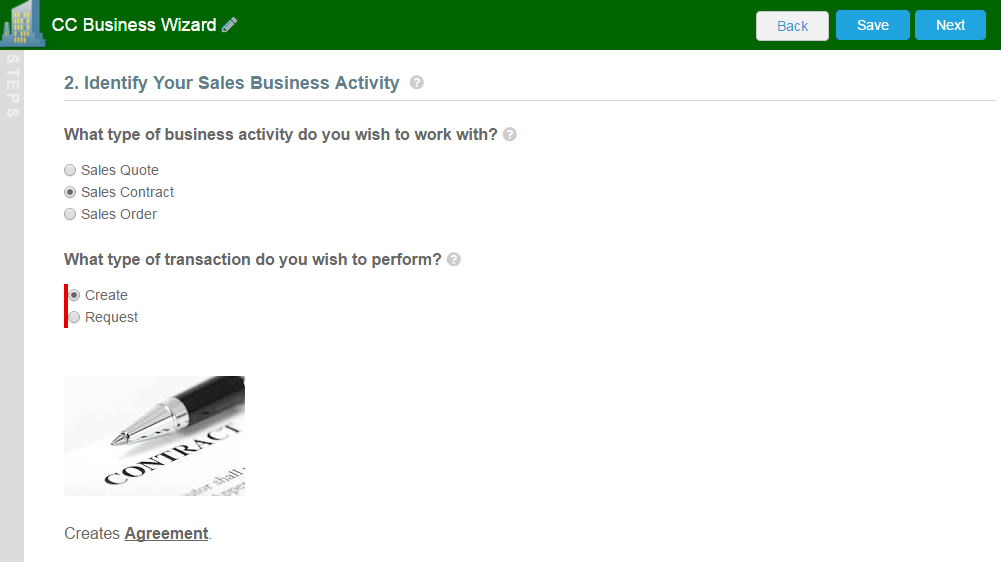Download PDF
Download page Use Case for Running Contract Wizard.
Use Case for Running Contract Wizard
This topic describes the use case for contract wizard.
This use case gives one example on how to run a contract wizard created by Administrator. You might use this functionality differently, depending on your business case.
This use case describes how a Sales Representative creates records based on any standard or custom Salesforce object (Agreements, Accounts, Proposals, Leads, etc.).
In this case, a Sales Representative can quickly create their own records by entering responses to criteria-based inputs that follow a logical series of steps.
Pre-requisite: Make sure you have the following:
- New inputs are created
- Steps are created
To Run a Contract Wizard
To run a Contract Wizard, perform the following steps:
- From the Salesforce application menu, choose Contract Wizard. The application displays the Home tab and the Wizards tab (you will see additional tabs if you have permissions to create Wizards).
Choose a Wizard to run from the drop-down list of designs and click Go.
Note
Wizards associated with deactivated or retired Wizard designs will not be available in this list. Ensure that you have not blocked pop-ups in your browser because new Wizards are always launched in a separate tab.
- (Optional) Click the pencil icon in the displayed banner to give your Wizard a unique name, so you can differentiate it from other Wizards you run using the same Wizard design.
The new name for your Wizard is shown in the list of In Progress and Submitted Wizards on the Wizards tab. Move through the steps of the Wizard, choosing values for the fields in each step. Click Next when you are finished with a step to move to the next step. Click Back to return to the previous step. Click Save to save the data on the current wizard page.
You must fill in all the required fields on the current wizard page before clicking Save; otherwise, the Wizard will throw validation error message.
When you choose options (or a combination of options) that result in the creation of an object record, the Object name or Record Type will be displayed immediately upon choosing the option. For example, in the following step, when you choose Sales Contract as the business activity and Create as the transaction type, the Wizard evaluates a condition that determines that an Agreement record will be created when the Wizard is submitted.

- Some Wizard steps may include the option to add comments and/or attachments in addition to providing traditional responses. You can add comments in the text area provided (500 character limit), and/or click Attach Files to attach files to the Wizard step. When you use the Wizard to create a record, the attached files are added to the Notes & Attachments Related List of the new record along with the recorded comments. To add an attachment:
- Click the Attachment(s) link below the Comments box. The Manage Attachments window is displayed.
- Click Add Files. Browse for a file on your machine and add it as an attachment. The attachment uploads to the Wizard and displays in the Manage Attachments window.
- Repeat the previous step for each attachment you want to add. Close the window when you are finished adding attachments.
- Click Add Item when there is a repeatable field in the Wizard. These fields are used when you need to enter multiple values as certain responses, for example when you are adding multiple business addresses, or product line items and prices to a Sales Contract.
- Closing the Wizard automatically saves your progress in the Wizard up to the current step. You can continue where you left off from the Wizards tab (see Using the Wizards Tab).
- When you have answered the final question in the Wizard and clicked Next, the page will display a Review of all steps you have completed.
- Click Edit to change your answers for any steps in the Wizard. A dialog box warns that you may have to repeat steps of the Wizard that you previously completed depending on edits you make.
- Click OK to edit the step or Cancel to return to the Review page.
- When you are satisfied with your responses, click Submit.
Depending on the design of the Wizard, one or more of the following will occur:- A record of the type determined by your inputs within the Wizard is created (e.g., a Sales Agreement record).
- You are redirected to the record details page of the record just created by the Wizard.
- You are redirected to another page in Salesforce.
- You remain on the Review page and the Wizard shows as Submitted (in this case data from the Wizard has been submitted for purposes other than creating a record).
Return to the Wizards tab. The Wizard you created and executed now shows its Status as Submitted in the list of Wizards.
Result:
You have created and executed the wizard.